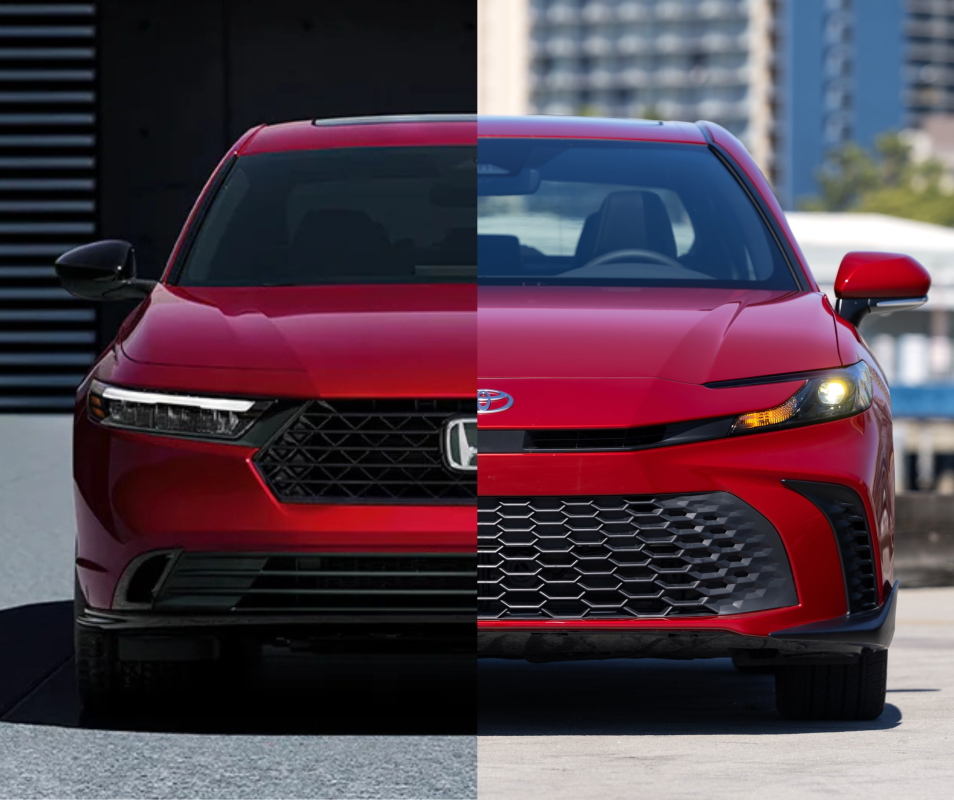2025 Toyota Camry vs. Honda Accord: 5 Key Differences

The Evolution of Midsize Sedans
The midsize sedan segment is undergoing a transformation, with several models being phased out. Notably, the Chevy Malibu and Subaru Legacy will no longer be produced after the 2025 model year. This leaves the Toyota Camry and Honda Accord as two of the most prominent players in the market. While both vehicles are popular choices for families, they offer distinct features that may influence a buyer’s decision.
Hybrid Powertrains: A Key Differentiator
One of the most significant differences between the Toyota Camry and Honda Accord lies in their hybrid offerings. All Camry models come equipped with a hybrid powertrain as standard. The redesigned 2025 Camry features a 2.5-liter four-cylinder engine paired with two electric motors, delivering 225 horsepower. Additionally, an all-wheel drive variant is available, which includes a third motor at the rear, boosting total output to 232 horsepower.
In contrast, the Honda Accord offers a hybrid option but only on specific trims. The base model comes with a 1.5-liter turbocharged four-cylinder engine, while the hybrid version features a 2.0-liter four-cylinder engine paired with a high-torque electric motor, producing 204 horsepower. However, the Accord does not offer an all-wheel drive configuration, making it more limited in terms of drivetrain options.
Price Differences Between Models
Another factor to consider is the price difference between the two vehicles. The base-level Toyota Camry LE starts at $28,700 and comes with a hybrid powertrain. On the other hand, the Honda Accord requires stepping up to the Sport Hybrid trim, which starts at $33,655. This nearly $5,000 difference can significantly impact a buyer's decision.
The higher trim level of the Honda Accord includes additional features such as 19-inch wheels, full LED lighting, and a 12.3-inch touchscreen display. Meanwhile, the Camry LE offers wireless charging and a smaller eight-inch touchscreen. While the Accord provides more tech features, the Camry remains more affordable across its range.
Top-Spec Models and Interior Features
At the top of the range, both the Toyota Camry and Honda Accord offer hybrid powertrains. The Toyota Camry XSE starts at $34,900 and includes premium amenities such as leather trim, heated front seats, and a 12.3-inch digital gauge cluster. The Honda Accord Touring Hybrid, priced at $39,300, comes with similar features, including climate-controlled seats and a Bose audio system.
While the Accord offers more luxurious interior options, the Camry maintains a competitive edge in terms of pricing. Both vehicles provide a high level of comfort and technology, but the choice ultimately depends on the buyer’s priorities.
Passenger and Cargo Space
Despite their similar wheelbases, the Honda Accord offers more passenger and cargo space compared to the Toyota Camry. The Accord provides up to 102.8 cubic feet of passenger space, compared to the Camry’s 98.8 cubic feet. In addition, the Accord offers more front headroom and rear legroom, making it a better option for larger families.
Cargo space also favors the Accord, with up to 16.7 cubic feet compared to the Camry’s 15.1 cubic feet. These differences can be crucial for buyers who prioritize storage and seating capacity.
Fuel Efficiency and Performance
Fuel efficiency is another area where the two vehicles differ. The Toyota Camry LE achieves up to 53 mpg in the city and 50 mpg on the highway, making it one of the most efficient sedans in its class. The hybrid models maintain strong fuel economy, with the XSE AWD earning up to 44 mpg in combined driving.
The Honda Accord EX-L Hybrid is slightly less efficient, with 51 mpg in the city and 44 mpg on the highway. However, the gas-only models still offer respectable fuel economy, with up to 29 mpg in the city and 37 mpg on the highway.
Final Thoughts
As the midsize sedan segment continues to evolve, the competition between the Toyota Camry and Honda Accord remains fierce. With the departure of other models, these two Japanese rivals have solidified their positions in the market. However, as manufacturers shift focus towards electric vehicles, the future of the midsize segment remains uncertain. For now, the Camry and Accord continue to lead the way, offering a blend of performance, efficiency, and value that appeals to a wide range of drivers.